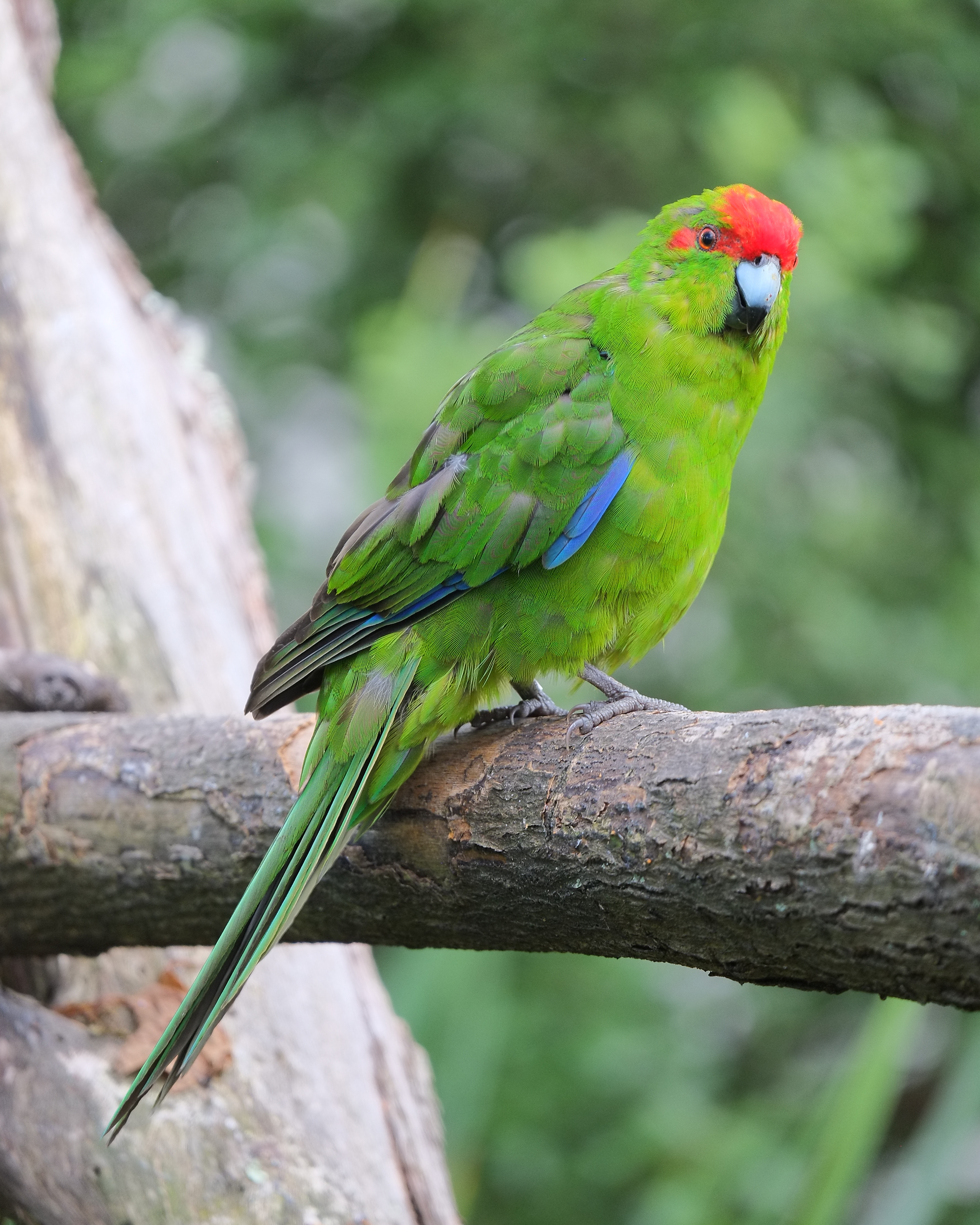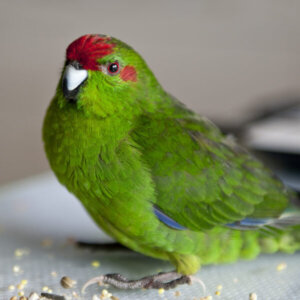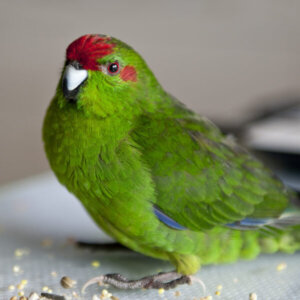Can Kakarikis Eat Oranges? Discover the Benefits and Risks
Yes, Kakarikis can eat oranges. Oranges offer many nutrients that benefit these birds.
They should be given in moderation. Kakarikis are small, colorful parrots that enjoy a varied diet. As pet owners, we often wonder which fruits are safe for them. Oranges are a popular fruit, rich in vitamins and minerals. But, can they be a healthy treat for your Kakariki?
Understanding which foods are safe is crucial for their well-being. This introduction will help you learn about the benefits and precautions of feeding oranges to Kakarikis. Let’s dive into the details and ensure your feathered friend enjoys a healthy, balanced diet.
Introduction To Kakarikis
Understanding the dietary needs of your pet birds is essential for their health. Kakarikis, also known as New Zealand parakeets, are lively, colorful birds. They have specific dietary needs that owners must know to keep them healthy and happy.
Kakariki Species Overview
Kakarikis are small to medium-sized birds native to New Zealand. They come in various colors, such as green, yellow, and red. These birds are known for their energetic and playful nature. They enjoy flying and exploring their environment. Kakarikis are also social and intelligent, making them great pets for bird lovers.
Common Diet Of Kakarikis
Kakarikis have a varied diet in the wild. They eat seeds, fruits, vegetables, and insects. This diet provides them with the necessary nutrients for their active lifestyle. Pet Kakarikis need a balanced diet to stay healthy. A mix of seeds, fresh fruits, and vegetables is ideal. Pellets can also be included for added nutrition.
Nutritional Value Of Oranges
Oranges are packed with vitamins, especially vitamin C, making them a healthy treat for Kakarikis. These fruits also provide essential fiber and antioxidants, supporting their overall well-being. Always serve in moderation to ensure balanced nutrition.
Oranges are a popular fruit known for their sweet and tangy taste. They offer many health benefits. They are rich in essential nutrients. Including oranges in your Kakariki’s diet can be beneficial. It is important to understand the nutritional value of oranges.Vitamins And Minerals
Oranges are packed with vitamins and minerals. They are an excellent source of Vitamin C. This vitamin helps boost the immune system. It also aids in the absorption of iron. Oranges contain Vitamin A, which supports eye health. They have small amounts of Vitamin B-complex, which helps in energy production. Minerals in oranges include potassium and calcium. Potassium is essential for muscle function. Calcium is important for bone health. Oranges also contain magnesium, which supports nerve function.Caloric Content
Oranges have a low caloric content. This makes them a healthy snack option. A medium-sized orange has about 60 calories. They are high in water content, making them hydrating. The low calorie content can help prevent weight gain in Kakarikis. Including oranges in your Kakariki’s diet can provide many benefits. Ensure to offer them in moderation. This will help maintain a balanced diet for your pet. “`Benefits Of Feeding Oranges To Kakarikis
Feeding oranges to Kakarikis can provide numerous health benefits. These vibrant fruits are packed with essential nutrients. Let’s explore how oranges can improve the well-being of your Kakarikis.
Boosting Immune System
Oranges are rich in Vitamin C. This essential nutrient plays a crucial role in boosting the immune system. A stronger immune system means fewer illnesses and a healthier bird.
| Nutrient | Benefit |
|---|---|
| Vitamin C | Boosts immune system |
| Antioxidants | Reduces cell damage |
Improving Feather Health
Oranges contain beta-carotene and other antioxidants. These nutrients are important for feather health. They help in maintaining vibrant and strong feathers.
- Beta-carotene improves feather color.
- Antioxidants prevent feather damage.
Including oranges in your Kakariki’s diet can lead to healthier, more beautiful feathers.
Potential Risks Of Oranges
Oranges are a popular fruit, but they pose some risks for Kakarikis. These risks can affect their health and well-being. It’s important to understand these risks before feeding your bird oranges.
High Sugar Content
Oranges contain a high level of sugar. While sugar provides quick energy, it can cause health problems in Kakarikis.
- Weight Gain: Excess sugar can lead to obesity in birds.
- Diabetes: High sugar intake increases the risk of diabetes.
- Digestive Issues: Too much sugar can upset their digestive system.
Monitoring the amount of orange fed to Kakarikis is crucial. Small amounts occasionally are safer.
Citrus Acidity Concerns
Oranges are acidic. The high acidity can be harmful to Kakarikis.
Here are the potential risks due to citrus acidity:
- Stomach Irritation: The acid may irritate their stomach.
- Beak Damage: Acid can erode the delicate beak surface.
- Calcium Absorption: Acidic foods can hinder calcium absorption. This can weaken bones.
To protect your Kakariki, limit their orange consumption. Provide a balanced diet with less acidic fruits.
Safe Ways To Introduce Oranges
Introducing oranges to your Kakarikis’ diet can be a great way to provide them with essential vitamins. However, it’s crucial to do it safely. This ensures their health and well-being. Below are some guidelines to help you introduce oranges to your Kakarikis properly.
Proper Portion Sizes
Start by offering small pieces of orange. A small slice or a few segments are enough. This helps you monitor their reaction. Small portions also prevent overfeeding and ensure they get a balanced diet.
Frequency Of Feeding
Offer oranges once or twice a week. This ensures they enjoy the benefits without overconsumption. Rotating oranges with other fruits keeps their diet varied and interesting.

Credit: www.facebook.com
Alternatives To Oranges
While oranges are a popular treat for Kakarikis, there are many other options. Offering a variety of fruits ensures your pet gets a balanced diet. Let’s explore some delicious alternatives to oranges that your Kakariki might enjoy.
Other Citrus Fruits
Besides oranges, you can feed your Kakariki other citrus fruits. These fruits provide similar benefits and can add variety to their diet. Here are a few options:
- Mandarins: These are smaller and sweeter than oranges. They are easy to peel and serve.
- Grapefruits: These have a tangy taste. They offer a good amount of vitamin C.
- Lemons: These are very sour. Use them sparingly due to their acidity.
- Limes: Similar to lemons, limes are also sour. Use them in small quantities.
Non-citrus Fruits
If you prefer non-citrus options, there are plenty of fruits to choose from. These fruits are nutritious and safe for Kakarikis.
| Fruit | Benefits |
|---|---|
| Apples | Rich in fiber. Remove seeds before feeding. |
| Bananas | High in potassium. Easy to peel and serve. |
| Grapes | Contain antioxidants. Serve in small pieces. |
| Berries | High in vitamins. Great for occasional treats. |
| Papayas | Good source of vitamins. Remove seeds before serving. |
These fruits provide essential nutrients and keep your Kakariki healthy and happy. Offering a mix of fruits can prevent boredom and ensure a varied diet.
Signs Of Allergic Reactions
Feeding Kakarikis oranges can be a delightful treat for them. But, it’s essential to watch for signs of allergic reactions. Kakarikis, like many birds, can have allergies. Recognizing these signs early can help you ensure their safety and well-being. Below, we explore the various symptoms to look out for.
Behavioral Changes
One of the first signs of an allergic reaction is behavioral changes. Your Kakariki may become unusually restless. They might start scratching more often. They could also become less active and seem lethargic. Observing these changes can help you act quickly.
Physical Symptoms
Physical symptoms are more visible. Look for redness or swelling around the beak. Check for unusual feather loss. You might also notice changes in their droppings. These signs indicate that your Kakariki might be allergic to oranges.
It’s important to take these symptoms seriously. If you see any of these signs, stop feeding them oranges. Consult with an avian vet to ensure your bird’s health. Being proactive can prevent serious health issues for your Kakariki.

Credit: www.northernparrots.com

Credit: en.wikipedia.org
Frequently Asked Questions
Can Kakarikis Eat Oranges Safely?
Yes, Kakarikis can eat oranges safely. Oranges are a good source of vitamins. Ensure you remove seeds and offer in moderation.
Are Oranges Healthy For Kakarikis?
Yes, oranges are healthy for Kakarikis. They provide vitamin C and other nutrients. Always serve in small amounts.
How Often Can Kakarikis Have Oranges?
Kakarikis can have oranges once or twice a week. Overfeeding can lead to digestive issues. Moderation is key.
Should I Peel The Orange For My Kakariki?
Yes, you should peel the orange before giving it to your Kakariki. The peel can be tough to digest.
Conclusion
Oranges can be a healthy treat for your Kakarikis. They provide essential vitamins and hydration. Always serve oranges in moderation to avoid digestive issues. Remove seeds and peel to ensure safety. Monitor your bird for any adverse reactions. Your Kakariki will likely enjoy the juicy fruit.
Offering a variety of fruits keeps their diet balanced and interesting. Consult with an avian vet for personalized advice. Keep your feathered friend happy and healthy with mindful feeding practices. Enjoy watching them relish their orange slices!
Hello Dear, I'm Poli Kolymnia, owner of many birds (including budgies).
With a deep passion for these feathered companions, I'm here to share my expertise and extensive knowledge on birds care.
My articles cover essential topics like diet, housing, care, and health, providing practical tips to help you create a happy and thriving environment for your birds.





